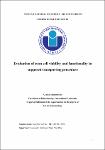| dc.description.abstract | Mesenchymal Stem Cells (MSC), also termed Mesenchymal Stromal Cells, are multipotent cells that can differentiate into a variety of cell types and have the capacity for self-renewal. Unlike bone marrow stem cells, UC- MSCs can be collected by painless procedure and faster self-renewal properties [1]. The commercial and clinical development of cellular therapy products will be parallel to the need of optimization in transportation and frozen storage of cellular. Optimising cryopreservation and transportation method are as important as optimisation of the cell culture process in obtaining the quality product to use in clinical (Hunt, 2019). Not all cells and tissues respond equally to a given cryopreservation protocol. Differences in their physical and biological make-up, such as membrane permeability and surface to volume ratio, produce varying responses to the cryopreservation process leading to differences in viability on subsequent thawing (Hunt, 2019). Therefore, this study aims to contribute a method of transportation suitable for Umbilical cord- Mesenchymal stem cells (MSCs) and evaluate the procedure by adipogenic differentiation and osteogenic differentiation method as well as characterization MSC using flow cytometry (FCM). The result demonstrated there is no significant differences between control and transported- cell in viability. Whereas, the cell after applying transporting procedure and condition then storage in 15 days shows the deterioration in its function proved by the result in cell expressing markers. This deterioration might happen due to the unstable in temperature, which is change from -80° C to -20° C in the transporting box and transfer to -80° C in refrigerator. In conclusion, this procedure of transportation success in transporting stem cell maximum within 128 hours and the time of storage at 80° C after transportation suggest for the best quality in viability and functionality is up to 10 days.
Keywords: Umbilical cord – Mesenchymal stem cell, transporting process, Adipogenic Differentiation, Osteogenic Differentiation, FCM – flow cytometry | en_US |


